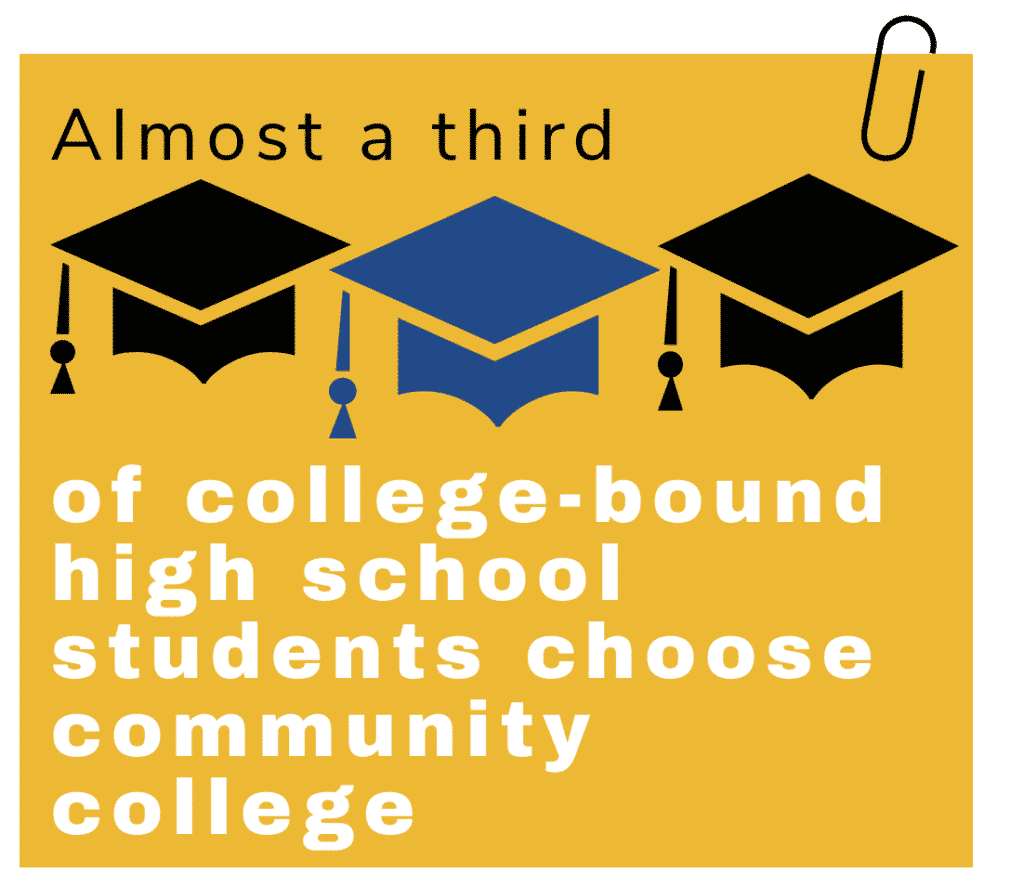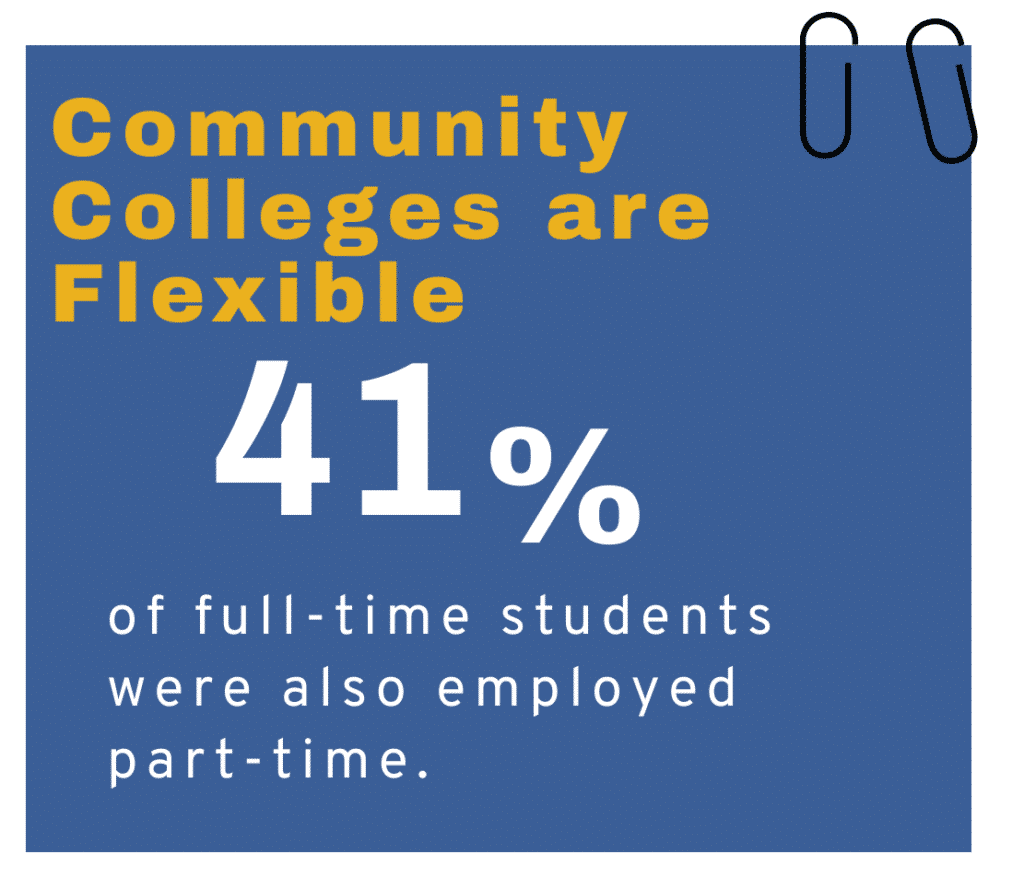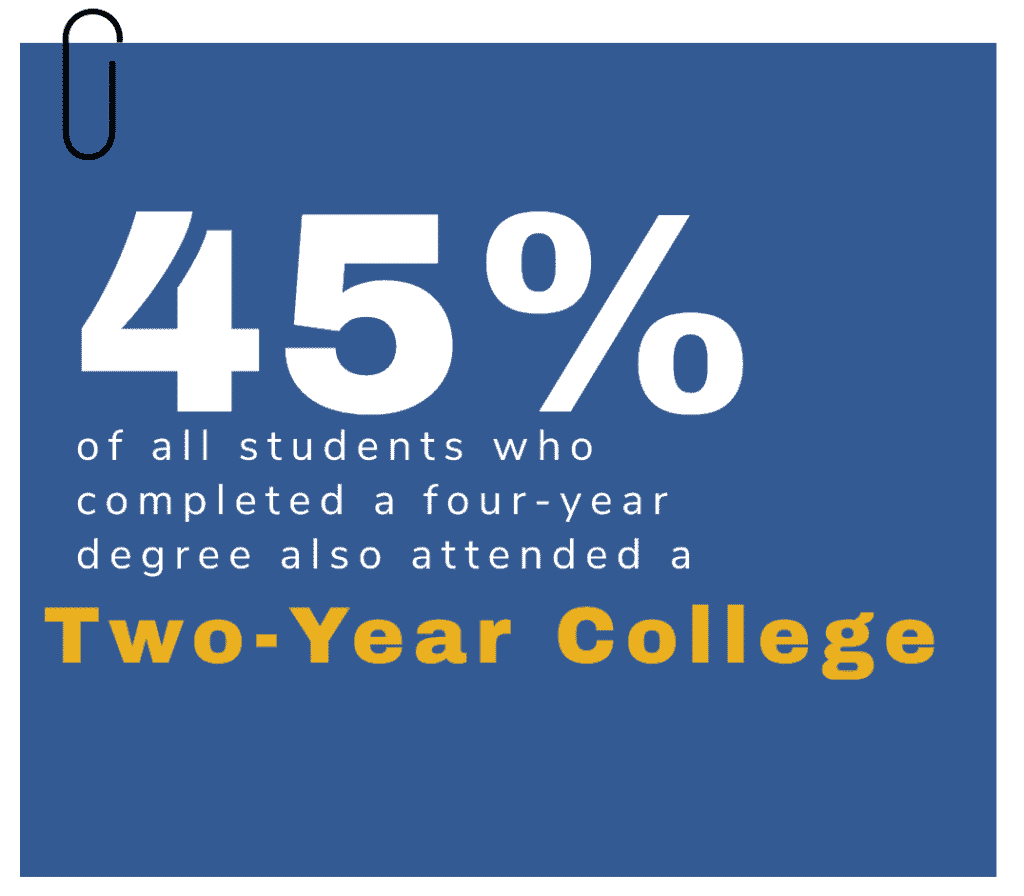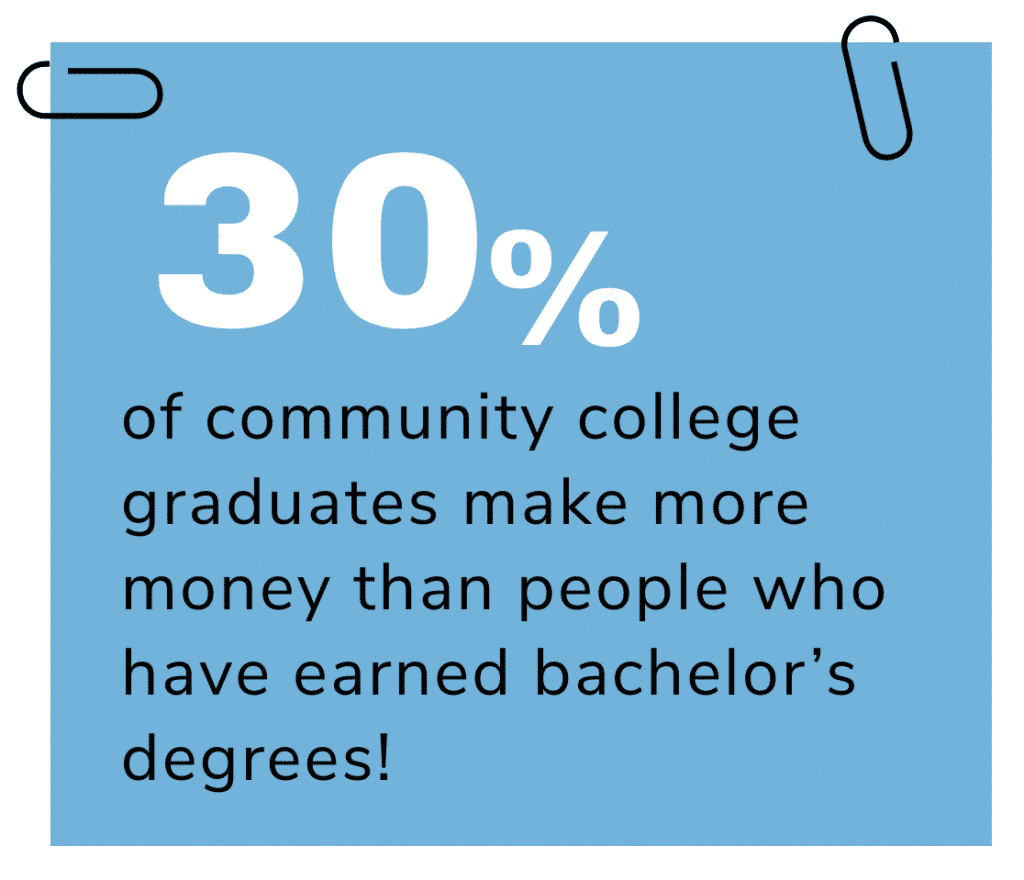If you’re thinking about attending a community college, you may be wondering, “what is a community college?” The community college definition is straightforward: these schools are typically lower cost than traditional colleges and offer two year degrees instead of four year degrees. The definition of a community college means that these institutions make higher education accessible to more people than traditional four year schools.
What is a Community College, and What Makes them Different?
Some students who wonder, “what is a community college?” decide to get a head start on their education by taking their first two years of classes at a community college, and then finish their second two years at a four year school, allowing them to earn their bachelor’s degree. Other students who are curious about the definition of a community college may take two years of classes to earn their associate’s degree, allowing them to move forward in their careers.

If you’re ready to make strides in your education while also getting great value for your money, attending a community college may be a good fit for your needs. Let’s take a look at some of the specifics of attending a community college, and why it can be so helpful in furthering your education and advancing your career.
What are the Advantages of Community College?
Wondering whether going to community college first makes sense? For most people going to community college first is a great way to save some money while also getting the education that you need. There are many advantages to community college, and saving money is just the start.
Some students who are wondering, “should I go to community college?” may be unsure of whether higher education is a good fit for them. Poor high school grades and/ or poor work habits can make some students wonder whether they’re cut out for college. One of the advantages of community college is that classes are often small, and admissions standards are not as strict as most four year colleges. This means that students who are wondering, “should I go to college?” after a tough go of it in high school may be a perfect fit for going to community college.
For students who are thinking about going to community college in order to eventually gain acceptance to a four year university, community college is a great start. If your grades, SAT, or ACT scores in high school weren’t as good as they could have been, and you’re wondering, “should I go to a community college?” the answer is yes. During your time at community college, you’ll be able to work hard with a fresh start. You’ll work closely with your professors, develop new study habits, and be able to show admissions officers at a four year university that you’re ready for their academic programming.
Some people who wonder, “why go to a community college?” may be curious about how much money they can save. Typically, one of the reasons why you should go to community college is that you can save a great deal of money. Your credits will count toward your four year bachelor’s degree, but they’ll be much less expensive than if you took the classes at a four year institution. Many people who are wondering “why go to community college?” may be unsure of whether the classes will be as rigorous as the classes at a four year university. One of the answers to the question, “why do people go to community college?” is that classes are offered at varying academic levels. For example, if you struggled in math in high school, your answer to “why go to a community college first?” might be so that you can brush up on your math skills to prepare yourself for the courses you’ll need while you earn your four year degree.
If you’re wondering, “Why go to community college first?” know that you’re not alone. Going to community college to get your associate’s degree, or transferring to a four year university after spending two years at a community college in order to get your bachelor’s degree at both great ways to work toward higher education at a price that makes sense.
If you’re thinking about going to a community college to further your career, talk with your employer to see if they have any programs with community colleges in the area. Many employers offer free or reduced cost tuition to employees who are interested in advancing their career by taking classes at a local community college.
How Much Does Community College Cost?
Curious about the cost of a community college? The cost of a community college can depend on several factors. Community college cost in an area with a high cost of living is likely to be more than the community college cost in an area with a low cost of living. Proximity to large schools may also play a role in community college costs. For example, a community college near a large, popular four year university may have higher community college costs than a school that isn’t so directly related to a large traditional university.

The cost of community colleges can also depend on the type of classes that you decide to take. If you decide to go with online learning, your cost of community college may be much less than someone who chooses to take traditional, in-classroom classes. If you’re thinking about taking some online classes to lower your cost of community college, you may want to look into hybrid options. The cost of community colleges can be significantly lowered if you’re willing to take some of your classes online. This is an especially important option if you’re an out of state student wondering how much do community colleges cost. For students in different states, the tuition rates for the average community college cost can be much higher than the rate for in-state students. If you’re looking at how much do community colleges cost and you want to lower your personal average community college cost, be sure to take a look at online classes for out of state students. At many community colleges, rates for in-state and out of state students are the same for online classes.
You’ll want to consider whether you choose a public or private community college to help you determine how much does community college cost. The average cost for community college at a public school will typically be much lower than the average cost for community college at a private school. The reason for this difference in how much does community college cost is that public schools receive state funding, while private schools rely completely on donor generosity and student tuition. This can make the average cost of community college much higher at a private institution.
In 2020, the average cost of community college is approximately $4,800 per year for in state students at a public school. The average cost of community college is approximately $8,600 per year for out of state students at a public school. The large discrepancy is due to the amount of money the school receives from the state for in state students. The average community college tuition at private schools is much higher – approximately $15,500 per year. If you’re able to find what you want to study at a public school, the average community college tuition is much lower, and the quality of education is typically quite similar.
For students wondering, “how much does community college cost?” it’s important to remember that the average tuition for community college isn’t the only factor to consider. To figure out, “how much does community college cost for 2 years?” you’ll also need to consider living expenses (whether you’ll live on campus or live at home), travel expenses, food, books, supplies, and more. In order to answer the question of, “how much does community college cost?” refer to your school’s website to help you get a better idea of the average tuition for community college when you consider additional factors.
When you see how much does community college cost for 2 years, try not to be overwhelmed. Remember that there are loan and grant programs available to help you get your education, especially if you’re an in state student at a public school. By choosing community college to start your higher education, you’re making the right move to get a high value for your money.
Is the Educational Quality of Community College Lower?
According to recent polls, the quality of education at a community college is just as good as the education at a four year college. One of the reasons that some people feel the education at a community college is not as good as that of a traditional college is due to the fact that it costs less. Don’t let that fool you. Because a community college only offers two year degrees, it’s able to offer you the same quality education at a lower cost.
If you take classes at a community college and then transfer to a traditional university, you may even find that you’re better prepared for your studies than other students around you. At many traditional universities, the first two years of classes take place in massive, auditorium style classrooms, with little to no personal attention from the instructor. When you take your first two years of classes at a community college, it’s likely that you’re getting the one on one attention you need to prepare you to succeed in the future.
Can I Transfer Community College Credits to a University?
When you take classes at a community college, you’re likely curious about how to transfer community college credits. Many students who transfer from a community college to a traditional four year university are interested in taking their credits with them. When you transfer community college credits, you’re making a smart move for both your finances and your education. A community college transfer is a great way to take the hard work you’ve done at community college and apply it to your four year degree.

If you know from the beginning of your studies that you’d eventually like to transfer from a community college to a four year university, talk with your advisor at the community college about how to prepare. You may also want to reach out to an admissions officer at your four year university of choice to learn more about how you can make yourself a desirable candidate for a community college transfer. It’s a good idea to request to be put in touch with an academic advisor in the area you’d like to study at the four year university. They can help you make sure that you’ll be able to transfer credit from community college so that they count toward your bachelor’s degree. They may also be able to advise you on what elective classes to take that will serve you well as you make the transition to a four year university.
When you want to transfer credit from community college, the process itself is simple. The academic office at the community college will send your transferable community college credits to university. Your credits will be applied to your account after you’ve been accepted. If you’re unsure about transferable community college credits to university, be sure to ask early. There’s nothing worse than putting in the hard work for a class and realizing that you can’t use the credits toward your four year degree.
If you want to do 2 years at community college then transfer to university, you’ll want to make sure you’re fully prepared to make the transition. Check out the course load that will be required in order for you to be a full time student at the university. If possible, take a similar course load at your community college. This will help prepare you for the workload that you can expect as you finish the final two years of your bachelor’s degree.
When you make the transition from 2 years at community college then transfer to university, you’ll want to work to develop close relationships with your instructors. Most four year schools are much larger than community colleges, and you’ll need to put in more effort to get the attention that you need. Attending office hours, asking questions in class, and simply sitting in the front of the room are all great ways to get to know your instructors (and to help them get to know you).
When transferring credit from community colleges to universities, the process should be simple. Don’t be afraid to speak up and ask questions, especially when it comes to getting your transfer classes from community college to university and your school’s bill. Attending a community college should save you a significant amount of money in the long run, and you want to make sure that every hour of hard work and every dollar spent go toward getting you your bachelor’s degree if that’s your ultimate goal. Don’t forget that community colleges are used to students wanting to transfer credits, and they’re experts at helping you make sure your credits can go to the four year school of your choice.
What Can I Study at Community College?
If you’re thinking about getting your degree at community college, you’re making a smart move. Getting a degree at community college is a perfect way to further your career. When you attend a community college, you’ll have the option to earn several two year associate’s degrees. Community college degrees can differ from school to school. Many people earn their two year community college degrees before moving on to complete two more years at a traditional university in order to get their bachelor’s degree.

Let’s take a look at some of the most common community college degrees among students today:
Certificates – Earning a certificate is a great way to show your employer (or potential employer) that you’re serious about staying on top of the latest research and knowledge in your field. Many people earn certificates as a way to break into a new career field, while others earn certificates in order to advance in their career. Different certificates require different periods of study. Many certificates are available fully online, while others require an in person component. When you’re looking for types of degrees in community college and you come across certificates, remember that most employers don’t consider a certificate to be an official degree. Rather, it’s considered to be an extension of the highest level of education you’ve completed.
Associate’s Degrees – An associate’s degree is a two year degree of study that qualifies the student for a specific industry. An associate’s degree is considered a midway point between a high school diploma and a bachelor’s degree. While many students who earn their associate’s degree go on to earn their bachelor’s degree, some students do not. If you’re considering earning your associate’s degree, it’s a good idea to talk with an academic advisor about how you need to prepare if you plan on moving forward to earning a bachelor’s degree. You may need to take specific courses or complete internships that will fully prepare you to complete your four year course of study at a traditional institution.
If you’re researching, “what degree does community college offer?” you may not be sure what type of degree makes the most sense for you. If you’re not sure what type of degree is a good fit for your career and academic goals, make an appointment to talk with an advisor at a community college. They’ll be able to talk with you about your career goals and get you moving in the right direction. Deciding what degree makes sense for you can be tough, and some guidance can be helpful.
Wondering, “what can I study in community college?” In addition to choosing a type of degree, it’s important to choose one of the community college majors that makes sense for your career goals. Let’s take a look at some of the most common community college majors among students today:
Law enforcement – Many law enforcement agencies now require higher education as a prerequisite to being considered for a position. Some people who earn their associate’s degree in law enforcement go on to complete a four year degree in crime, law, and justice, or in pre-law studies. If you’re interested in working in law enforcement, earning your associate’s degree is a smart first move, no matter how high you eventually want to climb on the career ladder. Getting an education in law enforcement can also be a great idea for anyone who wants to enter politics or a corrective profession. Knowing how the law works and how it’s enforced can be a huge asset in many public service careers. If you have your eye on a specific law enforcement job, be sure to check in with them before starting an associate’s degree program to find out the exact educational specifications required to qualify for the position.
Medical imaging – When most people think of medical imaging, they think of ultrasounds for pregnant women. While this is definitely a part of a medical imaging job, it’s much more extensive than that. Doctors use medical imaging to learn more about several different conditions in the body. Medical imaging is an important, fast-growing career field. If you’re interested in medical imaging, it’s important to know that you’ll need to invest in continuing education, as the field is growing and changing rapidly. Talk with your employer about whether they’ll pay for your continuing education requirements. Many employers are happy to foot at least part of the tuition bill in order to keep good, well educated employees on staff.
Dental hygiene – Learning how to clean, x-ray, and examine teeth is a huge need in society today. Dentists are constantly on the lookout for well trained, personable dental hygienists. If you love working with people, becoming a dental hygienist may be a good fit for you. This job is a great combination of providing direct patient care and using medical techniques to help improve dental health.
Certified nursing assistant – If you’re interested in working in a healthcare setting, becoming a certified nursing assistant may be a great fit for you. Certified nursing assistants, or CNAs, work directly with nurses and doctors to provide direct patient care. Qualified CNAs are needed in a number of settings, including hospitals, nursing homes, home health care agencies, and more. Becoming a CNA can be a great first step toward eventually becoming a registered nurse or a nurse practitioner.
Related Rankings: